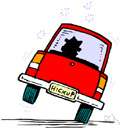meander
Also found in: Thesaurus, Medical, Encyclopedia, Wikipedia.
me·an·der
(mē-ăn′dər)intr.v. me·an·dered, me·an·der·ing, me·an·ders
1. To follow a winding and turning course: Streams tend to meander through level land.
2. To move aimlessly and idly without fixed direction: vagabonds meandering through life. See Synonyms at wander.
3. To speak or write in sustained fashion on a number of loosely connected topics.
4. To be directed in various directions or at multiple objects: His gaze meandered over the church's façade.
n.
1. often meanders A bend, turn, or winding, as of a stream or path.
2. A portion, side trip, or episode in a longer journey.
3. A passage on a subtopic or digression in a longer piece of discourse.
4. An ornamental pattern of winding or intertwining lines, used in art and architecture.
[From Latin maeander, circuitous windings, from Greek maiandros, after Maiandros, the Maeander River in Phrygia, noted for its windings.]
me·an′der·er n.
me·an′der·ing·ly adv.
me·an′drous (-drəs) adj.
American Heritage® Dictionary of the English Language, Fifth Edition. Copyright © 2016 by Houghton Mifflin Harcourt Publishing Company. Published by Houghton Mifflin Harcourt Publishing Company. All rights reserved.
meander
(mɪˈændə)vb (intr)
1. to follow a winding course
2. to wander without definite aim or direction
n
3. (often plural) a curve or bend, as in a river
4. (often plural) a winding course or movement
5. (Architecture) an ornamental pattern, esp as used in ancient Greek architecture
[C16: from Latin maeander, from Greek Maiandros the River Maeander; see Menderes (sense 1)]
meˈanderer n
meˈandering adj
meˈanderingly adv
meˈandrous adj
Meander
(miːˈændə)Collins English Dictionary – Complete and Unabridged, 12th Edition 2014 © HarperCollins Publishers 1991, 1994, 1998, 2000, 2003, 2006, 2007, 2009, 2011, 2014
me•an•der
(miˈæn dər)v.i.
1. to proceed by a winding or indirect course.
2. to wander aimlessly; ramble.
n. 3. a winding path or course.
[1570–80; < Latin maeander < Greek maíandros a winding, generic use of Maíandros the Menderes River]
Me•an•der
(miˈæn dər)n.
ancient name of the Menderes (def. 1).
Random House Kernerman Webster's College Dictionary, © 2010 K Dictionaries Ltd. Copyright 2005, 1997, 1991 by Random House, Inc. All rights reserved.
meander
Past participle: meandered
Gerund: meandering
| Imperative |
|---|
| meander |
| meander |
Collins English Verb Tables © HarperCollins Publishers 2011
meander
A curve in a river that swings in wide loops from side to side.
Dictionary of Unfamiliar Words by Diagram Group Copyright © 2008 by Diagram Visual Information Limited
ThesaurusAntonymsRelated WordsSynonymsLegend:
Switch to new thesaurus
| Noun | 1. |  meander - a bend or curve, as in a stream or river meander - a bend or curve, as in a stream or riveroxbow - a U-shaped curve in a stream stream, watercourse - a natural body of running water flowing on or under the earth curve, curved shape - the trace of a point whose direction of motion changes |
| 2. | meander - an aimless amble on a winding course | |
| Verb | 1. |  meander - to move or cause to move in a sinuous, spiral, or circular course; "the river winds through the hills"; "the path meanders through the vineyards"; "sometimes, the gout wanders through the entire body" meander - to move or cause to move in a sinuous, spiral, or circular course; "the river winds through the hills"; "the path meanders through the vineyards"; "sometimes, the gout wanders through the entire body"go, locomote, move, travel - change location; move, travel, or proceed, also metaphorically; "How fast does your new car go?"; "We travelled from Rome to Naples by bus"; "The policemen went from door to door looking for the suspect"; "The soldiers moved towards the city in an attempt to take it before night fell"; "news travelled fast" snake - move along a winding path; "The army snaked through the jungle" wander - go via an indirect route or at no set pace; "After dinner, we wandered into town" |
Based on WordNet 3.0, Farlex clipart collection. © 2003-2012 Princeton University, Farlex Inc.
meander
verb
noun
Collins Thesaurus of the English Language – Complete and Unabridged 2nd Edition. 2002 © HarperCollins Publishers 1995, 2002
meander
verb1. To move or proceed on a repeatedly curving course:
2. To move about at random, especially over a wide area:
The American Heritage® Roget's Thesaurus. Copyright © 2013, 2014 by Houghton Mifflin Harcourt Publishing Company. Published by Houghton Mifflin Harcourt Publishing Company. All rights reserved.
Translations
يَتَعَرَّج، يَنْعَطِفيَهيم، يَشْرُد
klikatit setoulat se
bugte sig
bolyongkacskaringóz
hlykkjast, bugîastreika
klaidžiotiklydinėti
klaiņotklīstlīkumot
kıvrıla kıvrıla ilerlemekorada burada dolaşmak
Collins Spanish Dictionary - Complete and Unabridged 8th Edition 2005 © William Collins Sons & Co. Ltd. 1971, 1988 © HarperCollins Publishers 1992, 1993, 1996, 1997, 2000, 2003, 2005
meander
[miˈændər] vi (= wind) [river] → serpenter; [road] → serpenter
A stream meandered towards the sea → Un ruisseau serpentait jusqu'à la mer.
A stream meandered towards the sea → Un ruisseau serpentait jusqu'à la mer.
[person] → flâner
Collins English/French Electronic Resource. © HarperCollins Publishers 2005
meander
vi (river) → sich (dahin)schlängeln, mäandern; (person) → wirr sein; (= go off subject) → (vom Thema) abschweifen; (walking) → schlendern
Collins German Dictionary – Complete and Unabridged 7th Edition 2005. © William Collins Sons & Co. Ltd. 1980 © HarperCollins Publishers 1991, 1997, 1999, 2004, 2005, 2007
Collins Italian Dictionary 1st Edition © HarperCollins Publishers 1995
meander
(miˈӕndə) verb1. (of a river) to flow slowly along with many bends and curves. The stream meandered through the meadows.
2. (of people etc) to wander about in various directions. His writing meanders all over the page.
Kernerman English Multilingual Dictionary © 2006-2013 K Dictionaries Ltd.